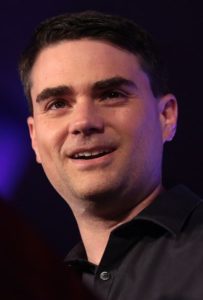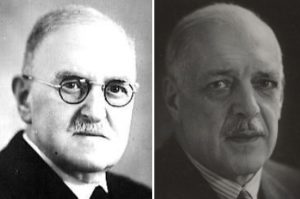America’s Top Political Pundit
Benjamin Aaron Shapiro (b. 1984) was born in Los Angeles to a Jewish family of Russian and Lithuanian heritage. His family became Orthodox when he was 9 years old, and Shapiro has been a Torah-observant Jew ever since. He skipped two grades and graduated from high school at 16, and from UCLA at 20 with a degree in political science. That same year, he published his first book, Brainwashed: How Universities Indoctrinate America’s Youth. By this point, his political column was nationally syndicated, and Shapiro still has the distinction of being the youngest person in American history to have a nationally syndicated column. Shapiro then went to law school at Harvard, after which he worked as a lawyer for several years. In 2012, he became the editor of Breitbart News, though he resigned in 2016 over disagreements over Breitbart’s direction. He subsequently became the number one target of anti-Semitism in America, according to the Anti-Defamation League. Since then, he has been the editor of The Daily Wire, which is currently the top news page on Facebook (and has more engagement than The New York Times, The Washington Post, NBC News and CNN combined!) He is also the host of The Ben Shapiro Show, now the second most popular podcast in the US (ninth-most in the whole world!) and carried by over 200 radio stations across the country. Shapiro is famous for his many stimulating speaking engagements on campuses, and for his quick wit and debate skills. Altogether, Shapiro has written 11 books thus far and is among today’s leading conservative commentators. He has sometimes been confused with the alt-right, who he actually strongly opposes, and has been a frequent target of. Shapiro is an avid violinist (see a 12-year-old Shapiro play “Schindler’s List” here). Last week, he was in Israel for a CPAC conference and several thousand people crammed into an auditorium to hear him speak. He also made sure to visit the Temple Mount and pray there.
7 Reasons Why Ben Shapiro is So Hard to Debate
Ben Shapiro: Why Kids Can’t Choose Their Own Gender
Investment Advice from the Lubavitcher Rebbe
Words of the Week
Before the thinkers of Athens came along, the Torah arrived at the notion of equality before the law. All public institutions in the Torah – the judiciary, the priesthood, the monarchy, the institution of prophecy – are subordinated to the law. Moreover, the law is a public text whose dictates are meant to be widely known, thus making abuse of power more obvious and safeguarding the common citizenry… the most important body of authority in the polity envisioned by the Torah is none other than the people themselves.
– Rabbi Dr. Joshua Berman (Ani Maamin, pg. 174)


 Lawrence Harvey Zeiger (1933-2021) was born in Brooklyn to Orthodox Jewish immigrants from Belarus. His father died when he was just a child, leaving the family impoverished. Young Larry was fascinated by radio and always wished to become a broadcaster. In Miami, he found a job cleaning at a radio station and, when the station’s broadcaster suddenly left the show, Larry was given a chance to take his place. The manager said “Zeiger” was not a good stage name, so Larry quickly chose “King” (based on an ad he had just seen for King’s Wholesale Liquor store). He got the job to radio DJ for three hours every morning, earning $50 a week. King soon started doing interviews, too, and would occasionally have a celebrity who was in town to do a show. He was then hired as a commentator for the NFL’s Miami Dolphins. It was in 1978 when The Larry King Show aired its first episode (on radio). It would be broadcast live every weekday at midnight, starting with a one-hour interview and followed by several hours of discussion. By 1985, King was a household name and was hired by CNN to star in a television version of his interview show. CNN’s Larry King Live went on to set a Guinness World Record as the “longest-running TV show hosted by the same person on the same network”. Many iconic moments took place in his studio, including the Perot-Gore debate of 1993 (which became CNN’s most-watched segment ever), and the joint interview of
Lawrence Harvey Zeiger (1933-2021) was born in Brooklyn to Orthodox Jewish immigrants from Belarus. His father died when he was just a child, leaving the family impoverished. Young Larry was fascinated by radio and always wished to become a broadcaster. In Miami, he found a job cleaning at a radio station and, when the station’s broadcaster suddenly left the show, Larry was given a chance to take his place. The manager said “Zeiger” was not a good stage name, so Larry quickly chose “King” (based on an ad he had just seen for King’s Wholesale Liquor store). He got the job to radio DJ for three hours every morning, earning $50 a week. King soon started doing interviews, too, and would occasionally have a celebrity who was in town to do a show. He was then hired as a commentator for the NFL’s Miami Dolphins. It was in 1978 when The Larry King Show aired its first episode (on radio). It would be broadcast live every weekday at midnight, starting with a one-hour interview and followed by several hours of discussion. By 1985, King was a household name and was hired by CNN to star in a television version of his interview show. CNN’s Larry King Live went on to set a Guinness World Record as the “longest-running TV show hosted by the same person on the same network”. Many iconic moments took place in his studio, including the Perot-Gore debate of 1993 (which became CNN’s most-watched segment ever), and the joint interview of 
